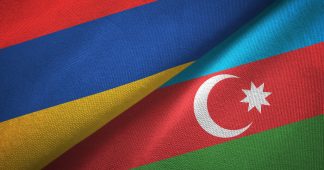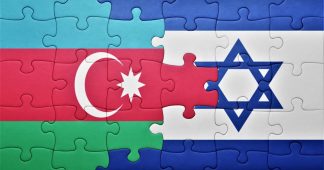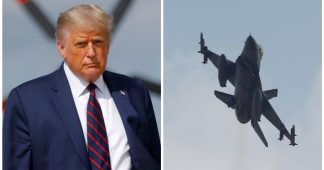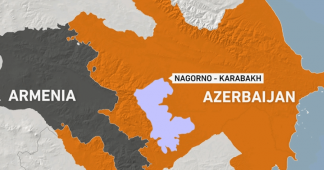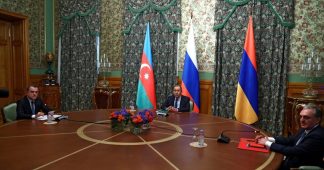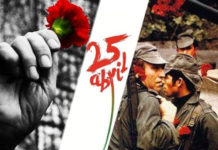Repurposed into a mercenary force by Erdogan’s Turkey, the remnants of Syria’s armed opposition were sent off to fight for Azerbaijan with promises of sweet paychecks. They met abuse, humiliation, and death instead.
By
In the first week of October 2020, Ahmad Hadad* and more than 20 other fighters from the Hamza Division faction of the so-called Syrian National Army stood in the middle of a mountain range in Azerbaijan near the Iranian border. They were lost.
After the Armenian army unleashed a bout of heavy bombardment on the mountains, the Azerbaijani soldiers who had been positioned behind the Syrians quickly fled, leaving the Syrians by themselves in unfamiliar terrain. An artillery shell landed near one of Hadad’s commanders, Muhammad Shaalan, killing him instantly.
Two of the youngest, strongest fighters in the group carried Shaalan’s body and made their way out of the mountains to look for their base. When the men became overwhelmed with fatigue, they dropped the body and let it roll down the mountain slopes to save them the effort.
Hours passed, and the Syrians realized they were no closer to finding the way back. Three fighters decided to sit with Shaalan’s body to wait for the others to return with help, knowing that if they didn’t, the body would likely be lost in the mountains forever.
After the other men left, the three who remained were met with a flurry of bullets from the south. Another Syrian National Army militant, Hussein Talha, was struck and killed. The two surviving men fled to the northeast until they reached a point where other Syrian fighters from the Hamza Division had gathered.
“The situation was tense, with our commander coordinating with the Turks to find out why the Azerbaijanis had abandoned us,” Ahmad Hadad said. “They recovered the bodies and returned them to Syria. But things got worse for us. I mean, many more of us died in Azerbaijan.”

A flight to Baku
It was last July when men from the Syrian National Army (SNA), a collective of militant Syrian opposition factions supported and supervised by Turkey, learned that they might be deployed to Azerbaijan, a country few of them had even heard of. They were told they would be acting as border guards, and that the assignment would be easy and combat-free.
On September 22, 2020, a source from the Sultan Murad faction of the SNA sent me a photo of dozens of militants on a cargo plane. “They’re going to Baku,” he wrote. “Now. And more will follow.”

Five days later, Azerbaijan launched an offensive on the Armenians in Nagorno-Karabakh, a flashpoint of dispute between Armenia and Azerbaijan. It relied heavily on support from Turkey and the mercenary forces it drew from the ranks of the Syrian militants it had spent years supplying in a failed and disastrous bid to topple the government in Damascus.
The myth of the moderate Syrian opposition
Since the start of the Syrian war, Turkey has been the most aggressive state supporter of the Syrian armed opposition. Turkey hosted the first military operations room of the Free Syrian Army (FSA) and was integral in facilitating support from Western and Gulf countries.
Turkey partnered with the United States and Saudi Arabia to create the train-and-equip program, an ill-fated venture which aimed to provide training and weapons to militants from so-called “moderate” opposition factions in Syria.
In 2014 in Aleppo, I interviewed fighters from Harakat Hazm and Jaish al-Mujahideen, two FSA factions deemed “moderate” by the US government.
“There is no such thing as a moderate Muslim,” one Jaish al-Mujahideen militant in Aleppo told me. “We are all Muslims. We all have beards. We all pray. Your government says we are moderate, but you will not find a moderate fighter in all of [opposition-held] Syria.”
Shortly after the first FSA militants from the Harakat Hazm faction were trained and given weapons, Syria’s al-Qaeda affiliate, Jabhat al-Nusra, fought and defeated them. Jabhat al-Nusra raided their weapons warehouses and stole their vehicles. Essentially, the train-and-equip program indirectly armed al-Qaeda.
Outside of the train-and-equip program, Turkey directly armed Jabhat al-Nusra. “I picked up weapons from the Syrian border three times in 2013 and 2014,” said Ziad Ibrahim*, a militant formerly from the Jaish al-Mujahideen faction of the FSA. “We would go to the border, meet a Turkish agent, and drive back to our headquarters with three cars’ full of equipment. Then, we would take a portion of the weapons Turkey gave us and leave them in a specified location. Jabhat al-Nusra would pick them up from that location.”
From the beginning of the war until 2016, Turkey’s border with Syria was virtually wide open for ISIS, al-Qaeda, and FSA militants to travel between the two countries. Ilyas Aydin, a Turkish ISIS leader now held prisoner by the Syrian Democratic Forces (SDF), a predominantly Kurdish, US-backed militia in northeastern Syria, said that he had meetings with Turkish national intelligence agents on the Turkish-Syrian border to discuss the passage of fighters and weapons.
“This isn’t about Islam,” Aydin said. “Erdogan doesn’t want an Islamic caliphate. He wants an Ottoman caliphate. For a time, ISIS was useful to him, because we controlled the areas of Syria along the border with Turkey. He wants Turkey to control the areas that we occupied.”
Only after ISIS was defeated in the parts of Syria bordering Turkey and replaced by the Kurdish SDF, Turkey constructed a border wall.
“We were already mercenaries and thieves”
In December 2017, the Free Syrian Army (FSA) became the Syrian National Army (SNA), further unifying militant opposition factions under Turkish control. In January 2018, using factions from the newly named SNA, Turkey launched Operation Olive Branch on Afrin, a Kurdish-majority city in northwest Syria.
In March 2018, after capturing and occupying Afrin, Turkish President Recep Tayyip Erdogan gave a speech highlighting the areas of Syria that Turkey planned to target next. “Next will be Manbij, Kobani, Ras al-Ain, Tel Abyad, Qamishli,” he said. In October 2019, Turkey and their SNA proxies attacked and captured Ras al-Ain and Tel Abyad. They are regularly attacking the Manbij area now.
“Afrin was when we started fighting just for Turkey,” said Mahmoud Azazi*, a Hamza Division militant who was in Azerbaijan for the duration of the war. “Afrin was fighters on their worst behavior. The [SNA] stole property and cars. They kidnapped Kurdish civilians and charged their families ransom. They killed civilians, and they raped women.”
“When Erdogan decided to send [SNA fighters] to Libya two years later, we were already mercenaries and thieves,” he added.
In December 2019, after Turkey signed an agreement with Libya’s Tripoli-based Government of National Accord (GNA), SNA militants were flown to Libya to support the GNA’s fight against their rival, the Benghazi-based Libyan National Army. Before a ceasefire agreement took hold last June, SNA sources estimated that Turkey had sent more than 15,000 Syrian mercenaries to Tripoli and Misrata.
Before the ceasefire, the SNA militants in Libya reported being used by the GNA and Turkey as infantry forces in the most dangerous battle zones. As in the Nagorno-Karabakh conflict, the mercenaries complained that they were lied to about the reason for their deployment to Libya. “They told us there would be minor combat,” one Sultan Murad militant said. “But now, our dead soldiers are lying in the streets.”
It has been relatively easy to keep in touch with SNA militants throughout their time in Libya. They have sent pictures and videos from well-appointed villas in Tripoli, long abandoned by civilians who fled the clashes and militia oppression rampant in Western Libya.
SNA fighters have spoken candidly about how they loot civilian homes and strip electrical wires for scrap metal, turning to the Libyan militants affiliated with the Government of National Accord to sell the items on their behalf.
In February 2020, Erdogan admitted that SNA militants had been sent to Libya. “Turkey is there with a training force,” he said. “And there are also people from the Syrian National Army.”
The difference in Turkey’s handling of the Syrian mercenaries in Azerbaijan was immediately apparent. On September 25, two days before Azerbaijan and Turkey started the war in Karabakh, Ahmad Khaled*, a Hamza Division militant in Idlib, fretted that he was unable to reach any of the Syrians deployed to Azerbaijan. “My brother, three of my cousins, many more people from my village… none of them have been on their phones since they left from Turkey,” he said.
Shortly after the war began, Khaled finally received a series of frantic voice messages on WhatsApp from his brother in Azerbaijan. “They took our phones at first,” he said, heavy explosions audible in the background. “And now, the internet usually doesn’t work. They threw us into battle directly. They told us before we left that there would be no fighting, and we would just be guarding the border for the Azerbaijanis, but already five from our group have died from shelling. We don’t know where we are. We need to leave this place.”
In the first few days of the war, SNA militants leaked two videos that Twitter users were quickly able to geolocate to Nagorno-Karabakh. Mainstream media outlets began to publish reports about the Syrian mercenary presence. Officials from Russia, France, and the US indicated that they had evidence of Turkey sending the SNA militants to Azerbaijan.
On October 11, a fighter from the Hamza Division filmed the corpses of Armenian fighters and posted the video on Facebook, where it quickly spread.
In an October 14 interview with France24, Azerbaijani President Ilham Aliyev denied the presence of Syrian mercenaries in Nagorno-Karabakh. On the same day, Turkey’s Erdogan addressed the mercenary accusations in a speech. “It is said that we have sent Syrians fighters to Karabakh,” he said. “Syrians have jobs in their own land. They didn’t go there.”
That evening, Ahmad Hadad, who was based in the same camp as the Hamza Division fighter who had posted the video, watched as Azerbaijani and Turkish intelligence pulled up in trucks. “They beat him. They kicked him. They did this in front of all of us, to instil fear,” Hadad said. “The Turks took this man away, and we haven’t heard from him since. They were very determined to stop information leaks from the Syrians in Karabakh.”
As the war continued, contact with SNA fighters in Nagorno-Karabakh was increasingly scarce. SNA commanders regularly warned their men not to share any information from the front lines. On October 25, Fahim Issa, commander of the Sultan Murad faction, disseminated a voice recording to his men. “Do not take pictures!” he bellowed. “Do not send anything to anyone, or you will be arrested!”
The war in Nagorno-Karabakh ended on November 10, 2020 with a trilateral peace agreement between Azerbaijan, Armenia, and Russia. By the end of November, the SNA mercenaries had been returned to Syria.
As time has passed and the fear of arrest has waned, more of the SNA men have been willing to share accounts and photos from their time spent embedded with Azerbaijani forces.

The Turkmen advantage
Syrian National Army sources say that Turkey sent an estimated 2,700 SNA militants to Azerbaijan. In a likely attempt to give the Turkish government deniability, mercenary logistics were handled by SADAT, a Turkish private defense contractor owned by Adnan Tanriverdi, President Erdogan’s former chief military counselor. (SADAT also handles the mercenary logistics for the thousands of SNA fighters Turkey has sent to Libya.)
Khaled Turkmani Abo Suleiman, a Turkman commander from the Sultan Murad faction, is believed to have acted as liaison between the SADAT and Azerbaijan in Nagorno-Karabakh.

The SNA militants in Nagorno-Karabakh primarily came from three factions: Sultan Murad, Sultan Suleiman Shah, and Hamza Division. Mahmoud Azazi says that around 500 of those sent were Syrian Turkmen, a Turkish minority concentrated mostly in northern Syria.
“There were five camps of mercenaries in Azerbaijan,” he said. “Hamza Division and Sultan Murad had two camps each, and Sultan Suleiman Shah had one. Each of the five camps had a Turkmen brigade.”

Mustafa Kassab*, a former SNA commander, says that ethnic Turkmen in the SNA enjoy special status. “There is a clear distinction between us, the Syrian Arabs, and them, the Turkmen. We started calling them ‘the new Alawites.’ The way Alawites [a minority sect to which Syrian President Bashar al-Assad belongs] in the Assad regime were better off than anyone else in Syrian society, this is how the Turkmen are. Because, to Turkey, they are Turks. We’re just Arabs.”
“It was never more clear than in Azerbaijan how Turkey values the Turkmen differently than us,” Mahmoud Azazi said. “The Arabs were in the most dangerous conditions. The Turkmen fighters were our translators, or they worked in the kitchen, or they guarded us to prevent us from leaving our camps. I don’t think a single Turkmen SNA fighter died in Azerbaijan.”
The battles in Nagorno-Karabakh
A Sultan Murad militant recalled an especially brutal day in early October: “My cousins and I have fought in Syria this whole war, and we’ve never seen anything like this. We were lost. We had no idea about the terrain, and only a rough idea of where we should go. Most of us only had AK-47s. In one battle, 45 of us were on some small hills. One sniper killed eight men from Sultan Murad and two from Hamza Division. The snipers are like we see in movies.”
The Sultan Murad militant said that Turkish military personnel were nowhere near the SNA in Karabakh. “I didn’t see anyone from the Turkish military after the plane ride to Azerbaijan,” he said. “Sometimes Azerbaijani soldiers were there, but they were standing 200 meters behind us.”
A Sultan Suleiman Shah militant who was in Azerbaijan for almost two months said the Azerbaijani soldiers cruelly abused the Syrian mercenaries. “Honestly, we were more afraid of the Azerbaijanis than we were of the Armenians,” he said. “They would beat anyone from the SNA who was afraid to go to battle. They treated us like dogs.
“Things were so badly organized, especially in the beginning,” the Sultan Suleiman Shah fighter continued. “Some of the men recruited into the SNA to go to Azerbaijan had never really fought before. They were just desperate men, living in the camps in Syria. And the coordination between us and the Azerbaijani army was terrible.”
“More than once, SNA men were mistakenly hit by Azerbaijani artillery,” he continued. “One time, after the men were hit with artillery, the Azerbaijanis accidentally ran over them with an armored vehicle. Seven men died because of this.”
Mahmoud Azazi said that after two weeks of enduring heavy casualties, around 500 SNA militants simply refused to keep fighting. “They told the SNA leadership they wouldn’t raise their weapons against anyone, and they demanded to be returned to Syria. When the leadership refused to return them, they began to protest. They threatened to storm out of the camp and disappear into Azerbaijan, something they knew the Azerbaijanis were very afraid of. Eventually, they returned around 300 of the men to Syria. They arrested the 10 men they believed to be responsible.”

The brutal conditions and heavy losses did not deter the SNA mercenaries from replicating the bad behavior they engage in in Syria and Libya. “Whenever we were in an area with houses, the men looted whatever they could. They complained that it wasn’t like Libya. There wasn’t much of anything good enough to steal,” Mahmoud Azazi said.
“Some of the Syrians started stealing cows and sheep and selling them to Azerbaijani brokers,” he added. “But this was very disturbing to the Azerbaijani soldiers, and it made them nervous about what else the Syrians might do. So they made a rule that no Syrian was allowed to leave his camp, ever, unless he was going to a battle.”
The payment promised to SNA militants deployed to Azerbaijan was roughly $2000 per month. The same amount was promised to the mercenaries in Libya, though, according to more than 50 men who fought from December 2019 to present, none ever received more than $400 a month.
“The commanders told us when we returned to Syria that, if we kept quiet, we would quickly get what we were owed,” Azazi said. “And we learned that the commanders already got paid, and most of the Turkmen fighters did too.”
In January, the sister of a Sultan Murad militant said that she had yet to receive the compensation SNA officials promised for the death of her brother, who had been killed alongside a Sultan Murad commander in the second week of the conflict in Nagorno-Karabakh.
“This is what the sultan, the Ottoman caliph, did to us,” said Azazi, in a derogatory reference to Turkish President Erdogan. “Who knows where we will be sent next. We hear Yemen. We hear Qatar. We are like a disposable force for Turkey to achieve their goals. We have battle experience. No one cares if we die.”
“Everyone in the SNA, even the most loyal to Turkey, knows that Turkey is not trying to help the Syrians,” he continued. “They are not supporting our revolution [against Syrian President Bashar al-Assad]. Because the revolution no longer exists. Turkey destroyed it, and now we are just fighting for Turkey’s interests. I swear to God, a growing segment of us here wish we could go back in time to how we lived before 2011, before the war. Because living with [Turkey’s] authority on our necks, this is worse than living under Assad.”
*Aliases used to protect the identities of SNA personnel, who would face arrest for speaking to a journalist.
Published at thegrayzone.com
